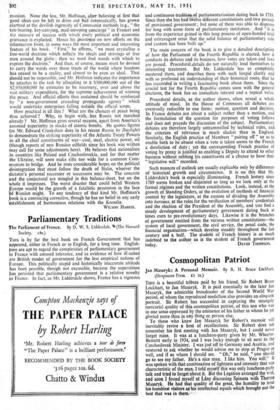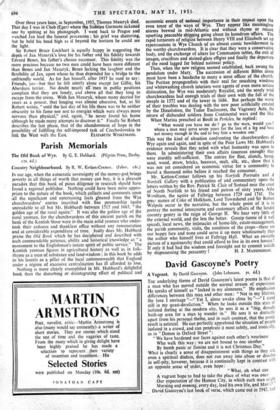Cosmopolitan Patriot
Jan Masaryk: A Personal Memoir. By It. H. Bruce Lockhart.
(Dropmore Press. 23.) THIS is a beautiful tribute paid by his friend, Sir Robert Bruce Lockhart, to Jan Masaryk. It is paid essentially to the later Jan Masaryk, the admirable broadcaster of the Second World War period, of whom the reproduced medallion also provides an eloquent portrait. Sir Robert has succeeded in capturing the strangely mercurial quality of this cosmopolitan patriot, of this son who was in one sense oppressed by the eminence of his father in whom he yet gloried more than in any thing or, person else. To those who knew Jan Masaryk Sir Robert's memoir will inevitably revive a host of recollections. Sir Robert does not remember his first meeting with Jan Masaryk, but I could neva forget mine. It was at a luncheon-party given by Mr. Wheeler- Bennett early in 1934, and I was lucky enough to sit next to the Czechoslovak Minister. I was just off to Germany and Austria, and ventured to ask whether he would advise me to stop at Prague as well, and If so whom I should see. "Oh," he said, "you should go to see my father. He's a nice man. I like him. You will." It was spoken with that combination of lightness and intensity that was characteristic of the man. I told myself this was only luncheon-part), talk and tried to forget about it. But the Legation arranged the visit, and soon I found myself at Liny discussing Spinoza with Thomas
Masaryk. He had that quality of the great, the humility to treat his humblest visitors utis intellectual equals which brought out the best that was in them.
Over three years later, in September, 1937, Thomas Masaryk died. That day I was in Cheb (Eger) where the Sudeten Germans sickened one by spitting at his photograph. I went back to Prague and watched Jan lead the funeral procession ; his grief was shattering, but he held his head high as if beyond the horizon he could see the light.
Sir Robert Bruce Lockhart is equally happy in suggesting the depth of Jan Masaryk's love for his father and his fidelity towards Edvard Benes, his father's chosen successor. This fidelity was the more precious because no two men could have been more different than Benes and Jan Masaryk, Benes lacking the laughter and the flexibility of Jan, upon whom he thus depended for a bridge to the unfriendly world. As for Jan himself, after 1937 he used to say: Friends, yes—but that he felt utterly alone except for Gillie, his Aberdeen terrier. No doubt nearly all men in public positions complain that they are lonely, and above all that they long to escape from the arena. With Jan Masaryk, whom many decried for years as a poseur, that longing was almost obsessive, but, as Sir Robert writes, "until the last day of his life there was to be neither obscurity to his fame nor rest to energies which were always more nervous than physical," and, again, "he never found his home although he made many attempts to discover it." Finally Sir Robert describes the last phase, that of the abandonment of hope in the possibility of fulfilling the self-imposed task of Czechoslovakia to



































 Previous page
Previous page